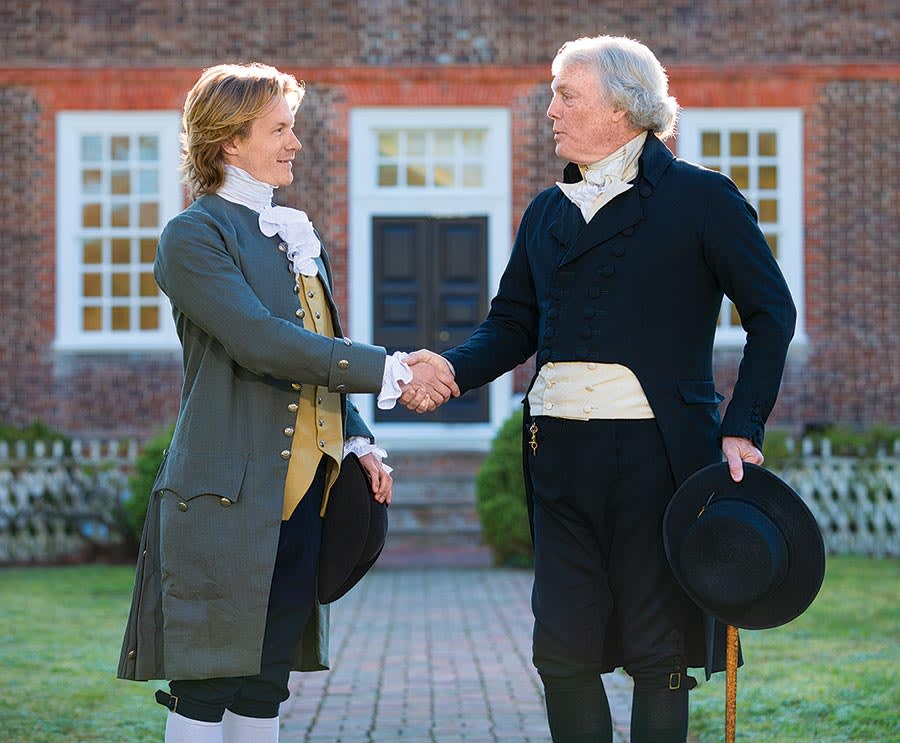Thomas Jefferson's story is big. So big that Colonial Williamsburg needs two people to convey his full evolution from an upstart patriot to a statesman who helped mold America.
For more than two decades, Bill Barker's warm, far-reaching interpretation of the patriot and third President has made him a Historic Area institution. He has become an ambassador for Colonial Williamsburg, representing America's ideals and complexities.
Now Barker has company in character on the streets of the Revolutionary City with Jefferson's younger self, portrayed by fellow actor Kurt Smith. The combination of the two roles has been a collaborative effort — and a challenge Barker said he relished. His first words when he was told that a younger Jefferson was joining the fold: "I'm on board." The next question was: "How do we do that?"
Barker soon discovered the big part he would play in the creation of the new role. "That's what the creative process is," he said. "I really appreciate the opportunity to say, 'Let's see how we're going to create this.' "
During a recent program at the St. George Tucker House, Barker broke character to publicly introduce Smith.
"It's a pleasure to have this voice, to be given this opportunity to speak as Thomas," Smith told the gathering.
Meanwhile Barker reassured his devoted fans that he is here to stay. "Retirement is not in my vocabulary," Barker said. "And you can never have too many Jeffersons."
As with fellow actor-interpreter Katharine Pittman's young Martha Washington, also portrayed as the elder Nation Builder by veteran colleague Lee Ann Rose, Smith's Jefferson provides a valuable perspective, said Ted Maris-Wolf, Colonial Williamsburg vice president of education, research and historical interpretation.
"We have two deeply talented individuals bringing to life one of the most extraordinary and complicated figures of the Founding era and even allowing us to put an elder statesman in conversation with his younger, Revolutionary self," Maris-Wolf said. "What questions would these men have wanted to ask each other? What sort of counsel would the elder have offered the rebel?"
Smith, who turns 33 this year, grew up in Arkansas with a math teacher mom and a chemist dad. At the University of Arkansas-Fort Smith, he studied biology in the hope of becoming a teacher himself. One day during his junior year, however, he spotted a poster on campus that read "Auditions Tonight," and biology was history.

Smith finished his undergraduate study in theater at the University of Montana and earned his master's degree at the University of Iowa. Opportunity led him, with his wife and fellow actor Michelle, to New York, where he worked in theater and made commercials.
A 2014 casting call promised an opportunity "'to cause a ruckus,' which sounded fun to me for a summer," Smith said. He and his wife got the jobs: roles in Williamsburg with a summer troupe specializing in commedia dell'arte.
"I remember thinking that these guys were so lucky to have this huge stage, an entire city," Smith said. "I definitely wanted to come back."
Last year came word of an opening as young Jefferson. Smith applied and bought a copy of historian Jon Meacham's Thomas Jefferson: The Art of Power.
"I began reading, and that's when I started realizing how intriguing this guy was," Smith said. "He had the same fears that we all do, and the same hope that a lot of us do: to be better. It came to be less of a routine application and more 'I really want this.'"
At his audition, Smith faced a firing line of questions in character. Barker asked the young Jefferson to name the greatest legacy left him.
"Kurt thinks about it," Barker said. "He says, 'I was left with great property.' He thinks further and says, 'I don't think there's any doubt in my mind the greatest legacy my father left me was an education.' And I just shouted, 'Bingo!' There it is."
Smith has immersed himself in research and, on Barker's advice, reads Jefferson's own writings almost exclusively.
"I have never in my life had so much available to me about a character, which is both freeing and terrifying," Smith said. He takes comfort that his character's period may extend only through Jefferson's work in France during his 40s.
Smith seeks to depict an "untested" young man.
"I hope to portray a Jefferson we don't often see — one who's not on a pedestal. I envision programs featuring Jefferson with his wife; Jefferson with one of his enslaved; Jefferson in one of George Wythe's moot courts, losing a case," Smith said.

Smith admits fear of being stumped by guests' questions. Of less concern are the inevitable barbs he'll face over Jefferson's words and actions.
Barker said he advised Smith to "be ready, and just remember that Jefferson was considered one of the most polite and mannered individuals of his day."
Like Barker, Smith welcomes questions about Sally Hemings, an enslaved woman Jefferson owned. Using compelling evidence gathered in the 1990s, Annette Gordon-Reed, now a Colonial Williamsburg trustee, wrote a Pulitzer Prize-winning book about the relationship between Jefferson and Hemings, and the DNA testing that confirmed a genetic match between a Hemings descendant and Jefferson descendants.
"I think it always needs to be treated with some reverence and dignity for them both, but I'm not going to whitewash anything," Smith said. "I'm not going to put words in the mouth of history, either. And if he didn't speak about it and she didn't speak about it, I feel it would be unethical for me to say one way or the other. So I have to walk the line."
Barker has astonished Smith with the depth and generosity of his mentorship.
"Anyone who's sat in front of Bill during one of his programs immediately feels his wealth of knowledge. But he is unbelievably generous and an unparalleled mentor, without egotistical attachment to a character he's portrayed for over 20 years," Smith said.
Barker cites the need to preserve character interpretation just as Colonial Williamsburg does the buildings of the Historic Area.
"Part of the sustaining of what we do is mentoring — helping the younger generation realize many of the legacies that now become their responsibilities — to adapt and adopt as they choose," Barker said.
Barker passed the torch, briefly, as he fielded questions after Smith's introduction at the Tucker House.
"The Democrats seem to take more credit for Jefferson," a guest began. "Would you consider the Democrats or Republicans more representing Jefferson's opinions?
Barker fell back comfortably into his chair.
"Kurt," he said, "it's your turn."
